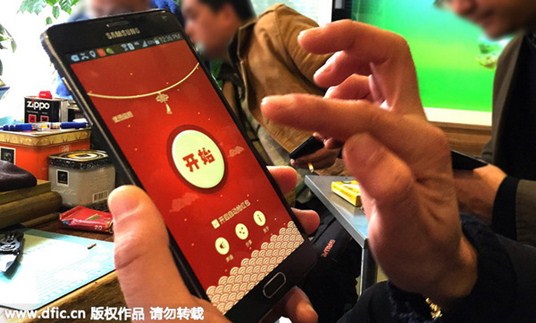Internet firms try to keep smartphone users hooked

A Chinese mobile phone user tries to snatch Hongbao (red envelope) via a mobile app in Chongqing municipality on Feb 24, 2015. [Photo/IC]
With the Year of the Rat just round the corner, internet-related companies are vying with each other to find strategies that can keep the multitudes of smartphone users in China engrossed.
Most of the users are in for a huge treat as more companies are planning to give away virtual red envelopes-a tradition of giving and receiving lucky money as gifts-during the Spring Festival that falls on Jan 25.
But experts said they have exhibited somewhat similar strategies to entice new users or enhance user engagement, underscoring the saturation of China's mobile internet market that could put a dent on revenue growth over time.
Though Tencent Holdings Ltd's WeChat popularized the digital red packet ritual in 2014, it is its burgeoning sister product Weishi, Tencent's short video app, that has taken the center stage this year. The company said on Wednesday it would spend 1 billion yuan ($145 million) to subsidize users who download the app and perform a variety of tasks.
From Jan 17 to Feb 8, customers are encouraged to send virtual red packets containing as little as 0.01 yuan as they share short video clips with peers who use the same app. The company then randomly subsidizes each red packet that could reach as much as 888 yuan.
Another chunk of the cash incentives comes from fulfilling tasks like watching and curating videos, inviting friends to download the app, collecting virtual cards regarding people's hometowns, among others.
Rival app Douyin, which claimed to have 400 million daily active users by January, is poised to dish out a generous 2 billion yuan. To take a slice of the pie, people need to participate in a variety of interactive games and sign up for lucky draws at designated periods.
The competing momentum is in line with the growing popularity of short video platforms, which are "set to have the biggest growth potential across all media forms in the coming two years", said Liu Yuan, an analyst on China internet research at UBS Securities.
"One noticeable trend of internet companies is to foster and facilitate creation of high-quality content in the digital realm, especially people-to-people engagements," he said.
What also differentiates this year's practice from previous years is the enhanced coordination among various business groups. For instance, Douyin users stand to split 500 million-yuan worth of cash if they manage to collect virtual cards containing logos of all six brands under Bytedance, including news aggregator Toutiao and photo processing app FaceU.
Search engine Baidu Inc also plans to leverage the occasion to create business synergies. Aside from Baidu's namesake mobile app, the company has appointed seven other apps that provide users a gateway to obtain a share from the 500-million-yuan cash pool.
And it doesn't shy away from the conspicuous intention of getting new users through the event, with 300 million yuan up for grabs exclusively for those who recommend friends to download the app.
Alipay, the mobile wallet with over 1 billion global users, is taking the modern Lunar New Year ritual farther overseas this year. Some 300,000 merchants in 56 economies allow participants to scan the different fu, or the Chinese character representing luck and fortune, spotted in shops, using augmented reality technologies.

